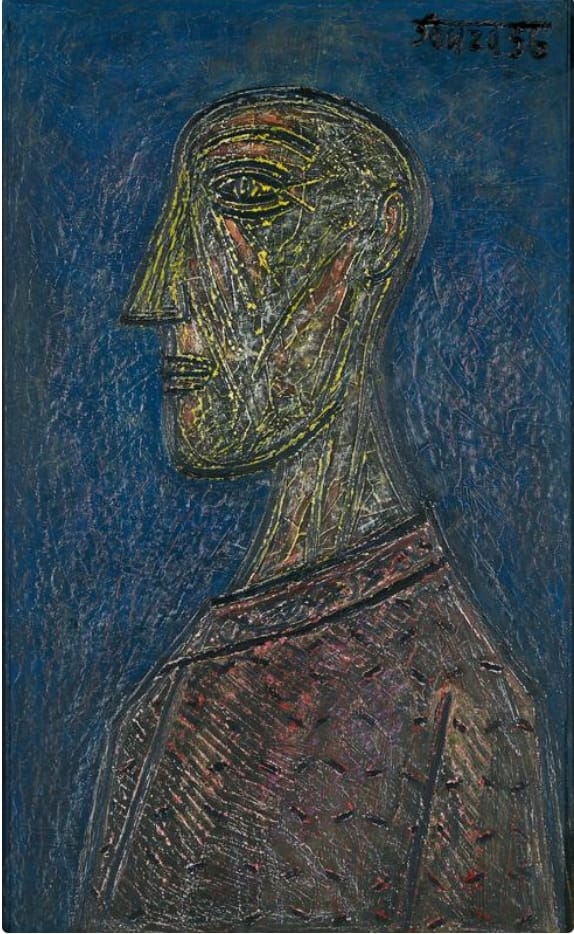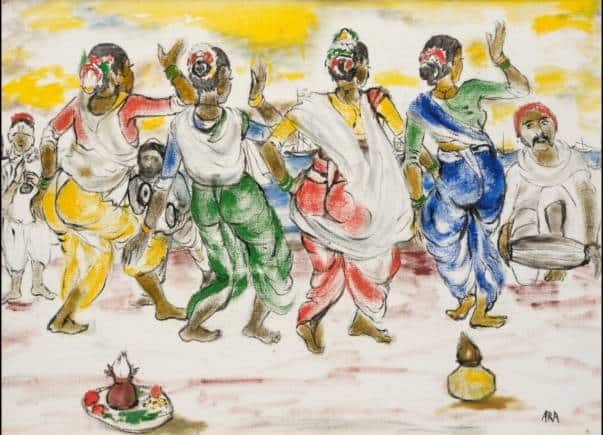



The founders of the Progressive Artists Group held only two exhibitions of their works in their entire lifetime. The last was in July 1949, two years after the formation of the group to seek a new vision for art in India when the country was on the cusp of independence. They mounted their works, which were completely different from each other in style and approach, on the walls of the Jehangir Art Gallery in Mumbai in an epoch-making exhibition inaugurated by the famed writer Mulk Raj Anand. The artists never showed their works again together.
 MF Husain's 'Princess Nisha Raje. Afternoon Tea With Lady Mcbull' (1997), which is part of Luminous Legacy, an exhibition of the works of the six original members of the Progressive Artists Group at the Triveni Kala Sangam, New Delhi (June 30-July 10).
MF Husain's 'Princess Nisha Raje. Afternoon Tea With Lady Mcbull' (1997), which is part of Luminous Legacy, an exhibition of the works of the six original members of the Progressive Artists Group at the Triveni Kala Sangam, New Delhi (June 30-July 10).
Seventy-five years later, the works of the six original members (none of them is alive today) of the Progressive Art Group are back on the walls again in an assertive show of their objective to practice art in a free and secular India that respected the plurality of the nation. Titled Luminous Legacy, the exhibition (June 30-July 10) which opened at the Triveni Kala Sangam in the national capital on June 30, has over 50 works, including paintings and rare drawings.
The Progressive Artist Group was founded by Francis Newton Souza, Syed Haider Raza, Krishnaji Howlaji Ara, Sadanand K Bakre, Hari Ambadas Gade and Maqbool Fida Husain in 1947. "Today we paint with absolute freedom for content and technique," wrote Souza in the group's manifesto that spelt out its purpose. The artists chose Baroda (now Vadodara), the cultural capital of Gujarat, for their first exhibition in 1947.
"In 1947, the Progressive Artists Group was founded by six artists. Two of them were Muslims, one was a Christian and the three others were Hindus. India was soon going to be free and a bloody partition was imminent. The country was in the grip of a huge communal tension. By coming together in the middle of all this, these six artists were reasserting the Indian plurality," says poet Ashok Vajpeyi, the executive trustee of the Raza Foundation, one of the partners of "Luminous Legacy". "Three years later, India was going to frame its Constitution that would formalise the plurality of the country."
Interestingly, there was no common artistic temper or approach that distinguished the group of six artists. Each had a distinct style though they were all deeply rooted and at the same time open to the world. "It was a kind of confident Indian rootedness that opened itself to the world," adds Vajpeyi. "No other group before or after them could produce eight globally renowned masters." The eight masters were Souza, Raza and Husain — the three original members of the Progressive Artists Group — and Akbar Padamsee, VS Gaitonde, Krishen Khanna, Ram Kumar and Tyeb Mehta, the five others who were later associated with the Progressives.
 A painting by FN Souza from the 1950s.
A painting by FN Souza from the 1950s.
The Progressive Artists Group had a short life, disbanding soon after their show in Mumbai, as Raza left for Paris and Souza and Bakre for London. However, they remained friends, companions and mutual critics for life, exchanging letters from far. An original letter Gade wrote in 1955 to Raza promising him to refund Rs 69 and one from Husain to Raza chastising him for missing a meeting in India are part of the exhibition. "Vacationing in countryside comforts is a bourgeois habit. Come out of it. Look at your Indian compatriots sweating and working in Delhi's months of inferno," jokes Husain in the handwritten letter.
 KH Ara's oil on canvas from the 1960s.
KH Ara's oil on canvas from the 1960s.
Among the works are Husain's Mehndi, a 1962 oil on canvas, and Toy series from the 1950s, Souza's Hampstead Terraces (1964), Raza's watercolours from the 1940s, Gol Gummad and In Forest and Ara's Foliage, Gade and Ara's works from the '50s and '60s. "Each of these artists were distinctly different," says art historian Geeti Sen, who has conceptualised the show. "Their aim was to produce art in the spirit of India, in a new climate of thought and a secular and free vision."
 SK Bakre's painting from 1964.
SK Bakre's painting from 1964.
While different in individual styles, the works, all of which are from the collection of the Progressive Art Gallery (founded in Delhi 25 years ago by city art connoisseur RN Singh borrowing from a name suggested by Souza himself), also reflect the shared ideals of freedom and artistic integrity of the six founders of the Progressive Artists Group. Ara (1914-85) was never trained as an artist and continued to wash cars like he did before. Raza (1922-2016) grew up in a mud hutment inside a forest in Madhya Pradesh and returned to India from France where he spent more than 50 years. Souza (1924-2002) was a rebel, who was expelled from Mumbai's JJ School of Art. Husain (1915-2011) painted cinema hoardings in Mumbai before bursting onto the art stage and lived in self-exile in Dubai and London until his death. Gade (1917-2001), a mathematics graduate, taught in a university even after he became an artist. Bakre (1920-2007), a sculptor, returned to live in a remote village on the Konkan coast in his last decades of life.
"From Souza’s brutal and occasionally poignant images to Husain’s expansive vision cutting across castes and community, from the rhythm of Ara’s raw, intuitive and unrestrained figures to Gade’s controlled abstractions, from Bakre’s experiments with texture to Raza’s metaphors of the bindu, we travel great distances in painting," says Sen, the author of Bindu: Space and Time in Raza's Vision (1997) and Image and Imagination: Five Contemporary Artists in India (1996). "Immense differences existed in the explorations by these artists. Yet by coming together to form the Bombay Progressives, they created a modern language in art."
 The exhibition has over 50 works by the six founders of the Progressive Artists Group.
The exhibition has over 50 works by the six founders of the Progressive Artists Group.
"I do not remember any other group, of thinkers, philosophers, musicians or writers, who proposed a vision of Indian modernity like the Progressives did," says Vajpeyi as Sen adds, "Their ideas continue to inspire artists today."
Discover the latest Business News, Sensex, and Nifty updates. Obtain Personal Finance insights, tax queries, and expert opinions on Moneycontrol or download the Moneycontrol App to stay updated!
Find the best of Al News in one place, specially curated for you every weekend.
Stay on top of the latest tech trends and biggest startup news.